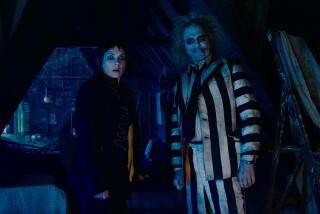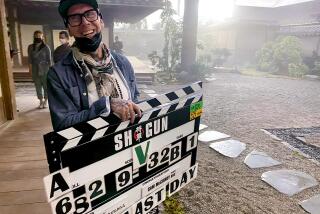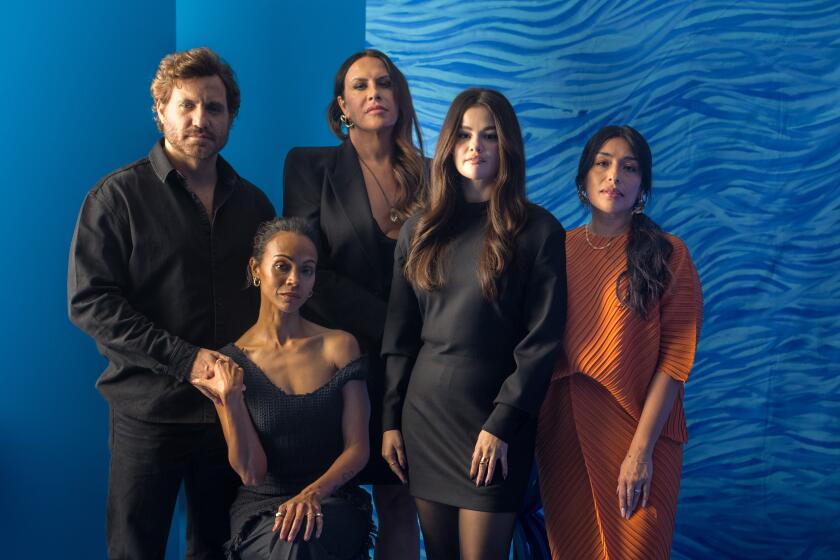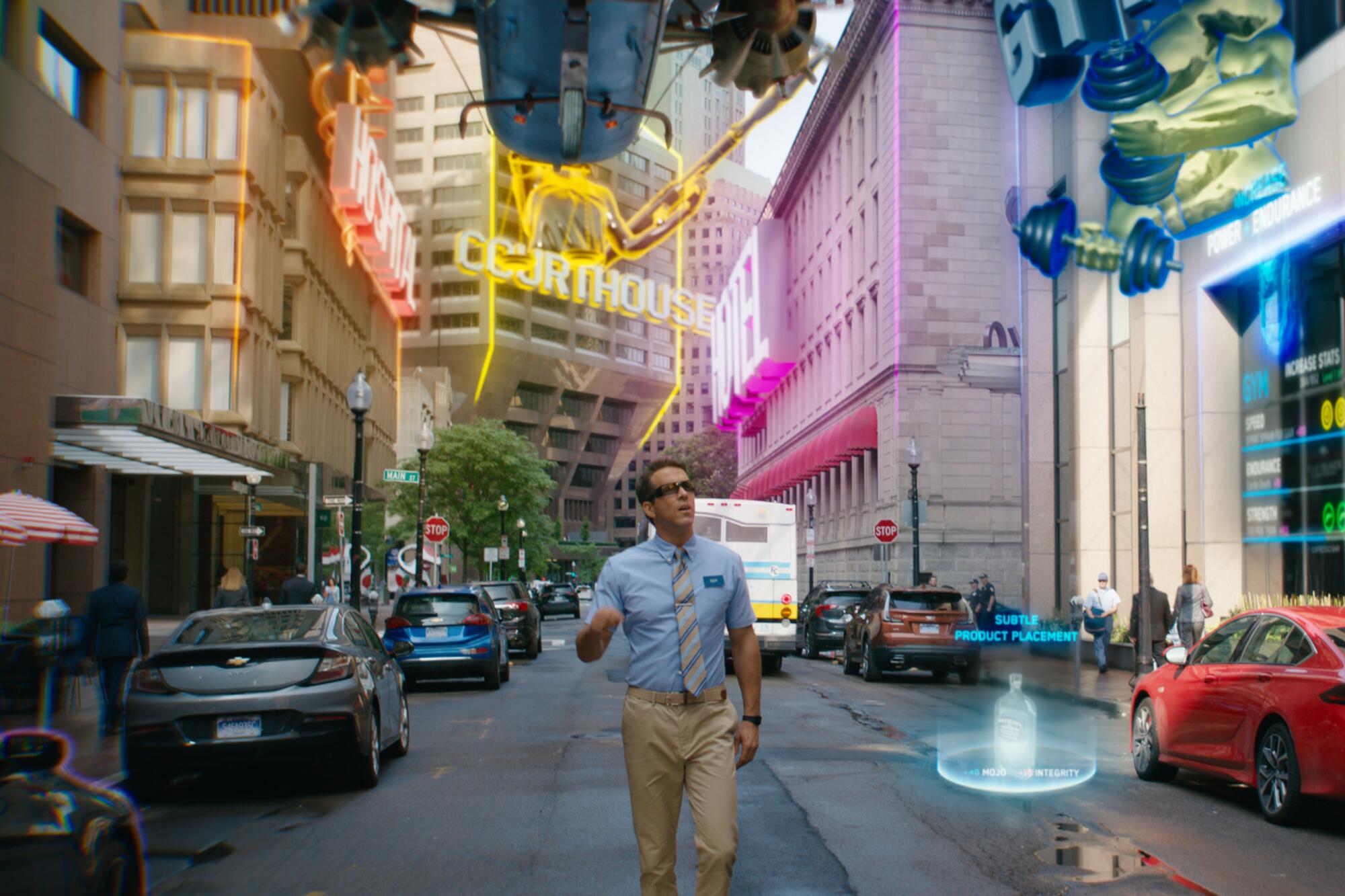
Shawn Levy turned down “Free Guy” the first time he was approached to direct it.
The film, which stars Ryan Reynolds as Guy, a non-playable video game character who discovers a new zest for life after falling for a gamer named Molotov Girl (“Killing Eve” star Jodie Comer), takes place mostly in Free City, a place not unlike the lawless, hyper-violent San Andreas of the “Grand Theft Auto” games.
“I think I read about a third of the script and said, ‘You know what? This should probably be some hardcore gamer that you get to direct it,’” Levy told The Times over Zoom. “And I moved on.”
Years later, Ryan Reynolds reached out to the “Night at the Museum” director after he received the script, without knowing Levy had previously been considered to helm it.
“I didn’t tell Ryan that I had already read it,” Levy said. “I said, ‘Why are you calling me? I’m not a hardcore gamer.’ Ryan says ‘[Let’s] take a video game premise but make a movie that is not just for gamers. Let’s make a new ‘Truman Show,’ a movie about personal awareness and empowerment and the very relatable notion that you can live in the background or you can step forward to be seen and effect change.’”
Levy agreed, and enlisted production designer Ethan Tobman and VFX supervisor Swen Gillberg to help fill in the gaps in his knowledge. “Literally I was getting ideas for jokes, Easter eggs, camera moves, story ideas, VFX ideas and stunt ideas from everybody,” Levy said. “This was very much a the-best-idea-wins culture.”
“Shawn’s really curious and I think that’s what makes him a great storyteller,” said Tobman. “He wants to surround himself with people who pitch ideas and he’ll take ideas from a PA, intern or his designer, DP or studio head and give them equal gravitas.”
Levy, Tobman and Gillberg recently spoke with The Times about the work it took to design three completely different worlds for “Free Guy.”
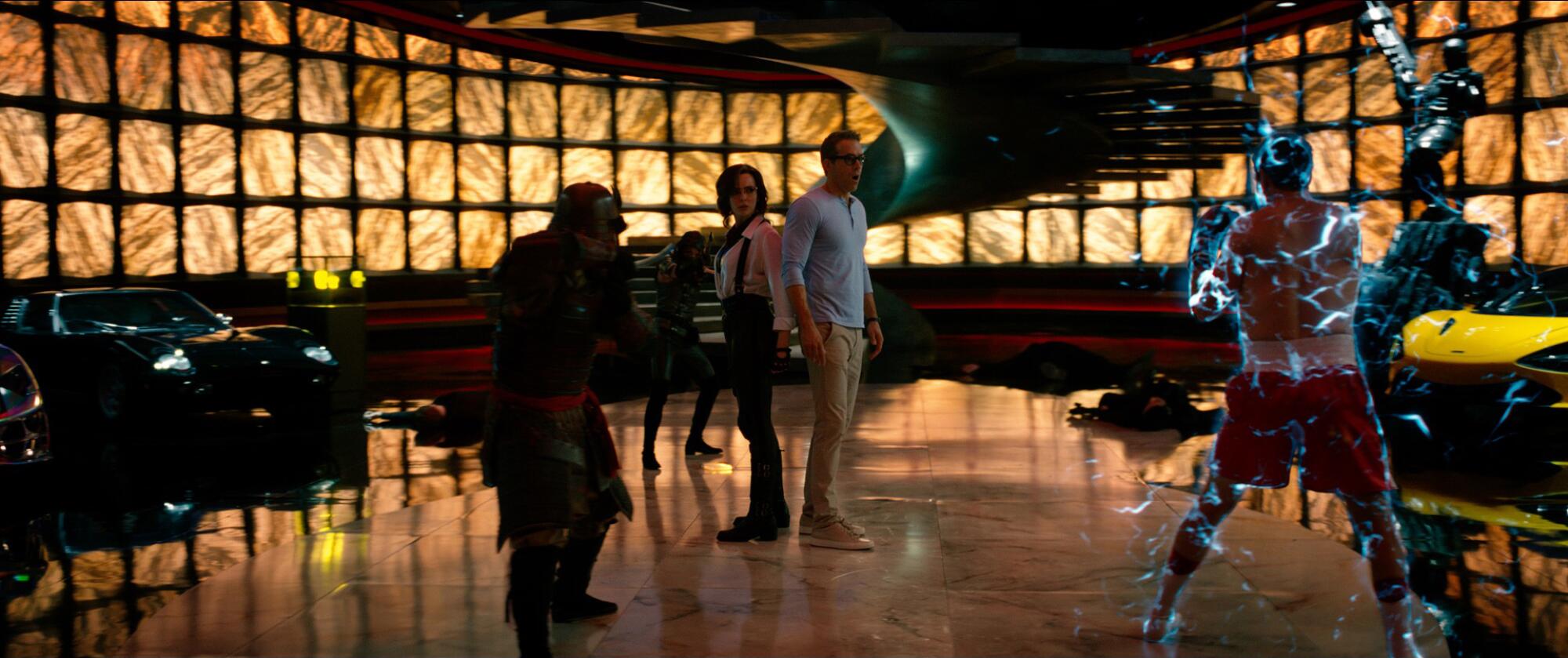
Aesthetic rules
One of the earliest decisions the crew made was to delineate the look of the three worlds explored in the film: Free City, the real world and the gameplay. “I knew early on that I needed to create these very distinct worlds and that I needed rigorous aesthetic parameters for each,” said Levy. “So early on we chose that Free City would look clean, deep-focused [and] compositionally very symmetrical.”
Every scene that took place in Free City was shot with a large-format camera and spherical lenses with a color palette that was bright, poppy and almost animated to create a sense of heightened reality. “We were trying to augment one versus the other,” said Tobman. “So we did a ton of branding and developed two stories of entire blocks with signage that you’d never see in the real world.”
On the other hand, the real world was depicted with a more restricted palette and different camera formats, lenses and operating styles. “We wanted to create really specific rules so that you knew from the first frame of one that you were no longer in the other,” said Tobman. So the real world was shot using frame obfuscation, anamorphic lenses, messier compositions, awkward reflections and perpetual rain. “There’s five different shades of gray and it’s very murky,” Tobman explained. “And life there is a little bit confusing and depressing.”
The gameplay “was the hardest,” said Levy. “We did a lot of variations. Whereas the movie might be more ‘GTA’-inspired, the look of the gameplay hews closer to ‘Fortnite’ in its aesthetic and level of stylization than any other video game reference.”
“We initially started out very photoreal and we found that you couldn’t separate what was on the monitor from the live action,” said Gillberg. “So we went in a very different direction and made the gameplay very cartoony at times. But we found that the audience didn’t have empathy for Guy so we then scaled it back to a more realistic but stylistic look, similar to ‘Grand Theft Auto’ or ‘Call of Duty.’”
“Those were kind of the main components of what we would call the look bible,” Levy said. “And I’m pretty pleased that no matter how many times you screen the movie, there’s never any confusion what world you’re watching. I think that’s our visual rules doing the work for us.”
Calling in the experts
During pre-production, the crew formed a think tank shooting out ideas, playing “tons” of video games and referencing several movies before coming to a decision on the look of Free City.
“I’m a gamer anyway, but I ended up playing video games really differently in prep,” said Tobman. “I wanted to see what was happening in the deep background, following non-playable characters for the whole game. I’d avoid the main plot and go right for the subplot. But I also started going crazy on YouTube, looking at mistakes and video bloopers.”
Levy spent time watching video games on YouTube and Twitch, including more obscure experiential games, with video game designer and code writer Mike Mika, who had been a consultant on “Ready Player One.” “They’re what’s called fishbowl games where the goal is not to kill, level up or acquire vehicles and weaponry but to watch the digital world evolve,” he said.
He also leaned heavily on Charlie Lehmer, a “big adorable gaming nerd” on the visual effects team.
“I’ve made 12 movies and Swen’s done ‘Avengers’ so we’re very experienced grownups,” said Levy. “And [yet] every time I would look at a sequence, I would go ‘Charlie, what do you think?’ Charlie became like the intern who had a megaphone. It was one thing if me, Ethan, Swen or our cinematographer George Richmond felt good about something, but unless I had Charlie, the voice of the actual gaming community, giving his blessing or calling bull—, I didn’t feel completely confident that we had nailed it.”
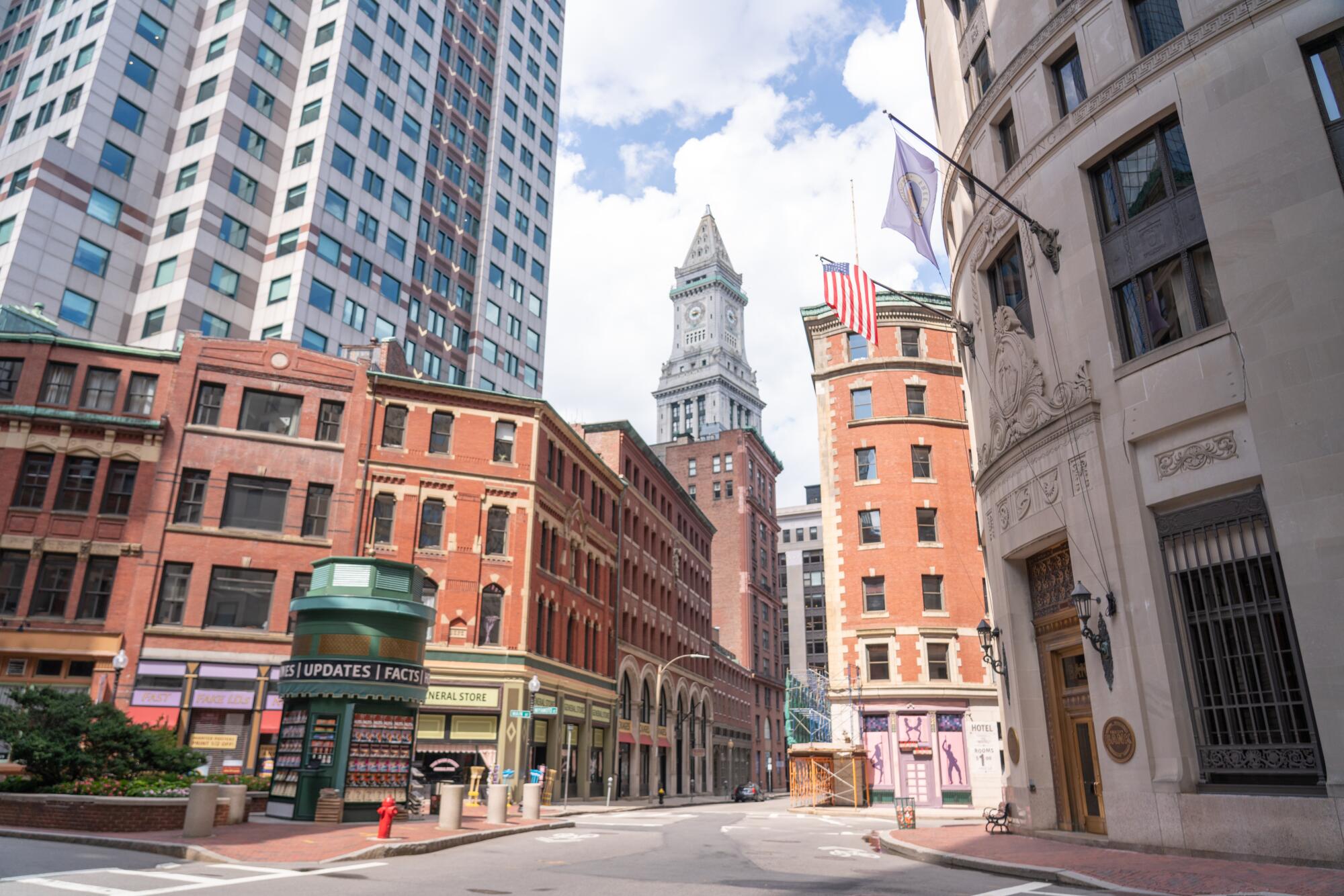
Location, location
The film was shot almost entirely in Boston with some reshoots taking place in L.A. The interiors were built either on airport hangars or soundstages with the capacity to house enormous sets. “I think we were really careful about using Boston for its famous Brutalist architecture for the outside world and its more provincial, bucolic, Federalist architecture for the world inside the game,” Tobman said.
But other cities like Seattle, Seoul, Tokyo, Pittsburgh and even Christopher Nolan’s rendering of Gotham City in “The Dark Knight” served as inspiration for the real world look of the film. Other influences included the films “Brazil” (1985) and the Hal Ashby satire “Being There” (1979).
“I’ve noticed a trend where video games have really been informed by movies and movies are now being informed by video games,” Tobman said. “When you play ‘Red Dead Redemption’ or ‘Shadow of the Colossus,’ you’re seeing some of the great Western film noirs or Ridley Scott sci-fis. There’s enormous creativity and world-building that goes into these. They’re using the same technology and software and even some of the same people [to make them].”
“There’s this fascinating strand of game design that is so clearly cinematic in its inspiration,” said Levy. “As a result, there’s not really a oneupmanship between the two mediums but a cross-pollination of ideas that have made both better.”
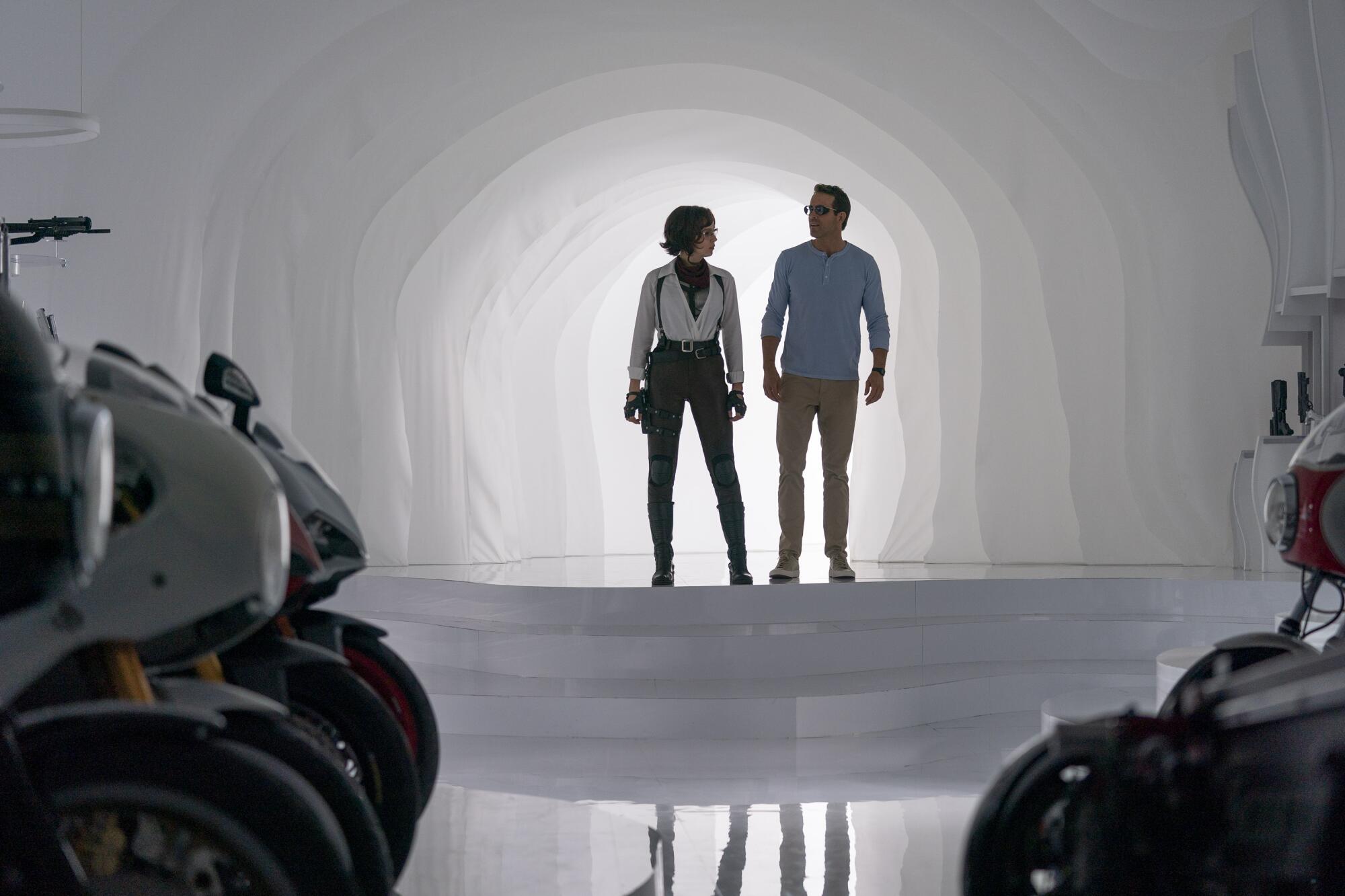
Feats of engineering
Tobman says his favorite set is Molotov Girl’s stash house, a set made entirely out of fabric, which was also the most technically difficult to achieve. “How do you light that? How do you film that?” said Tobman. “There’s no wood, metal or structure.”
Instead, the production design team built model renderings out of tracing paper and laser cut 300 pieces of paneling in slightly different shapes to resemble stalagmites. “We essentially built a cave out of fabric,” Tobman explained.
The set, which was made using a parachute-like material, took three months to make. It features a white plexiglass floor that mirrored everything “so you can’t have a single blemish” and required an “army” of people to stretch, steam, tighten and light it with a white lightbox. “So the whole thing looks like it’s breathing,” said Tobman. “It looks like you’re inside the belly of a whale.”
Levy says he’s most proud of a scene in the film’s third act when Guy faces off against Dude, a much dimmer and stronger version of himself. “We found the actor who plays Dude in a Google search and I recognized him from the gym where I go in L.A.,” said Gillberg.
“In the original script, Dude was meant to be a mirror image of Guy,” he added. “And so the original idea was that Ryan Reynolds would play Dude and Guy. But we didn’t want to have to go through the time that it takes to shoot one actor twice. So Shawn really wanted to find a way to shoot it simultaneously so that Ryan could play against Dude.”
Aaron Reed, the actor who portrayed Dude, was shot using motion capture and in post-production, the crew stitched Reynold’s face onto Reed’s body using the same technology.
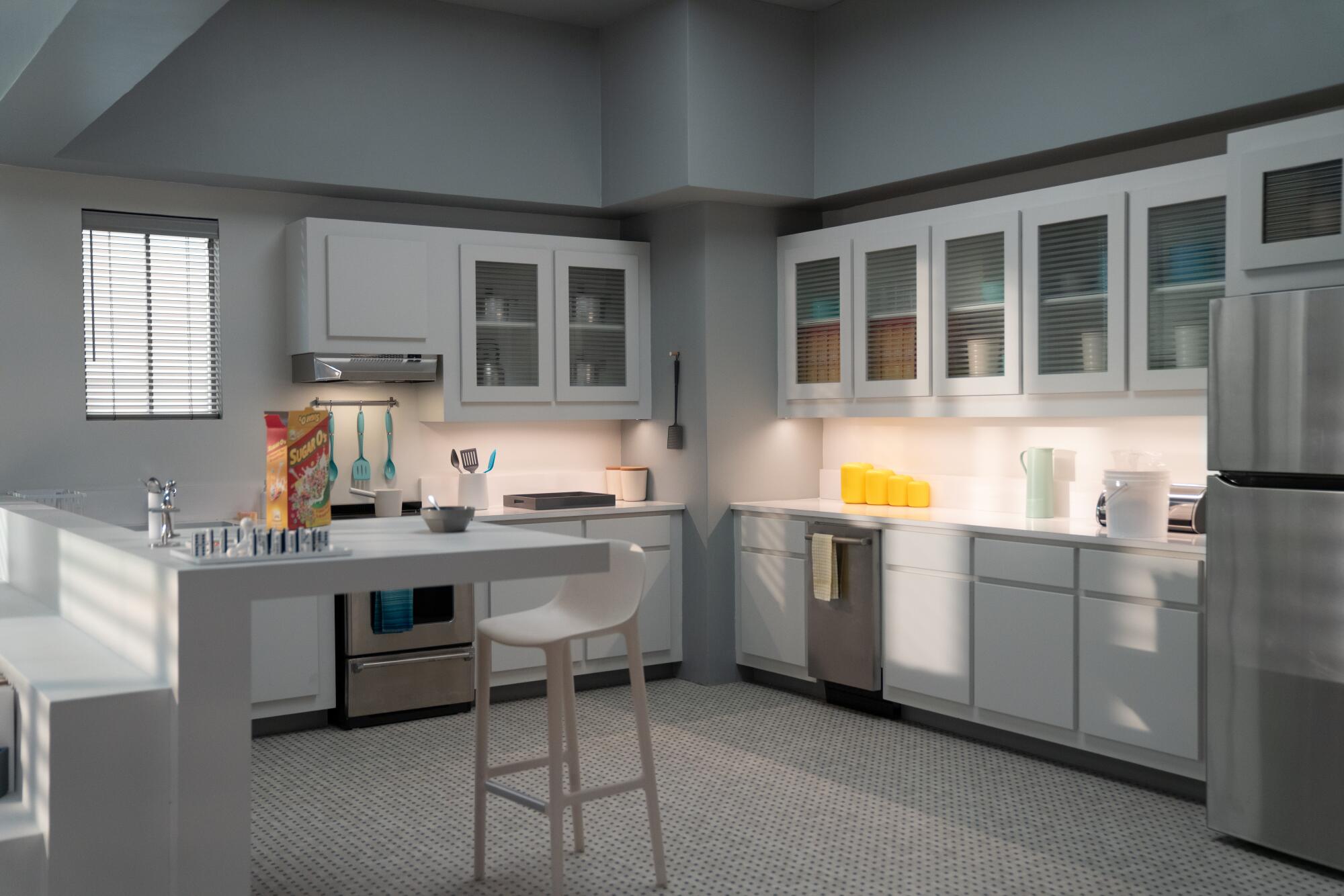
Easter eggs
The filmmakers were careful to bury plenty of Easter eggs for eagle-eyed fans.
“These are people who are trapped in a city and don’t know it so there are travel agencies advertising trips to nowhere where you don’t get off the plane, for prices that you can’t afford,” said Tobman. “There’s sales on department store windows that say ‘Sale tomorrow, and the day after that’ and they appear every day. There are fast food restaurants with happy meals that include grenades and nunchucks and machine rifles. We’re playing with the idea of a satire where we’re commenting on the world we know today: It’s hyper-violent, hypersexual and excessive.”
Guy’s apartment is another space that’s laden with Easter eggs. Because he’s a video game character, his apartment is intentionally half-developed.
“The [game designers] literally economized the amount of gigabytes they want to give to his house,” said Tobman. “So his front door has five deadbolts and no knob, his calendar is missing a day and his cabinet has a bowl and a spoon but no fork or knife because he only eats cereal. So that was an incredibly fun set to bury Easter eggs in. That apartment is really Guy’s predicament personified and externalized.”
More to Read
Only good movies
Get the Indie Focus newsletter, Mark Olsen's weekly guide to the world of cinema.
You may occasionally receive promotional content from the Los Angeles Times.
